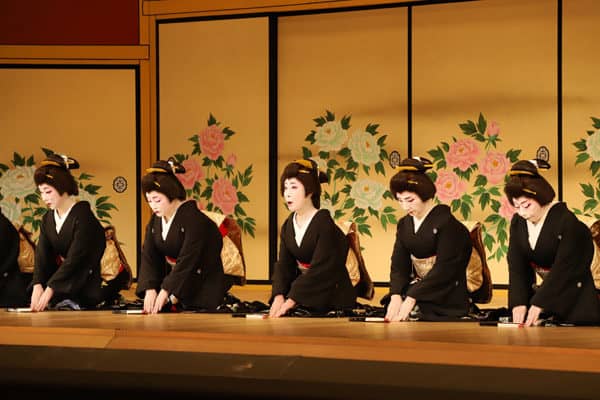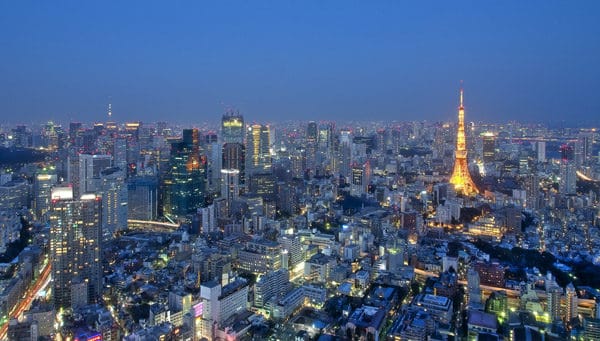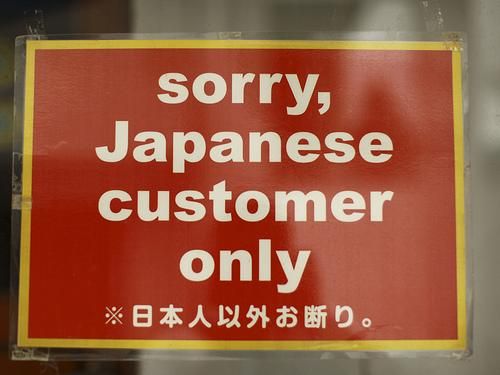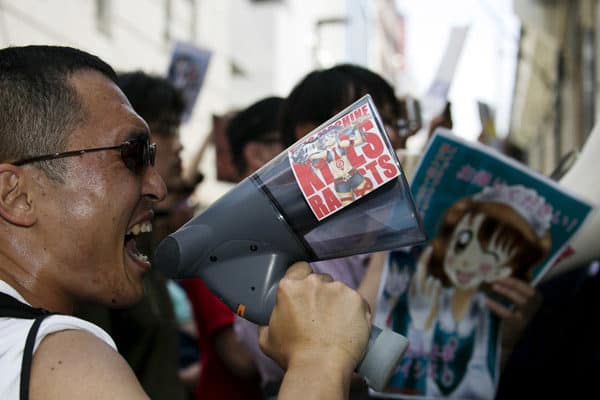An American Living in Japan
Neal Casy, American Renaissance, July 13, 2018
I am an American and have lived in Tokyo for most of my adult life. I am married to a Japanese woman with whom I have one child. When I left for Japan, I wanted to become a citizen of the world, which I considered superior to being merely American. Rather than achieving that aim, or even developing a deep understanding of Japan, my life here has brought into sharp focus what it means to be an American — and a white man. This is something I never even thought about, much less understood, when I was in the United States.
I came to Japan after graduating from college in the early 1990s. For the first five years, I deliberately avoided other foreigners and tried to immerse myself in Japanese culture. This was easy 25 years ago, since there were far fewer foreigners in Tokyo. At that time, I could go for weeks without ever seeing a foreign face. I made efforts to speak proper Japanese in an intelligent and educated manner. I taught myself to read and write Japanese. I carefully observed social manners and customs, doing the utmost to assimilate to Japanese culture.
For a time, I became “more Japanese than the Japanese.” I adopted the Japanese work ethic, spending tortuously long hours in the office, sometimes even sleeping at my desk overnight. I endured long commutes of up to two hours each way in jam-packed trains. When I would return with my wife on visits to the US, she noticed that I was unconsciously bowing to people and saying “excuse me” in Japanese if I accidentally bumped into someone. I even had dreams and conducted internal monologues in my head entirely in Japanese. At times, I still forget English words, and can think of only the Japanese word for something I want to say.
Like many Americans, I grew up with hardly any interest or understanding of my family history or ancestral homelands. What little I knew about Europe came from a decidedly anti-European corporate media. The liberal education I received about the United States was hardly better. By the time I graduated from college, the indoctrination was complete: I was an ill-informed liberal, embarrassed to be white, with no compulsion to celebrate the Fourth of July, Thanksgiving, or any other aspect of my heritage. Patriotism and pride had been wrung out of me. Perhaps it was inevitable that I would eventually gravitate toward non-Western countries.
While attending the University of Arizona, I became interested in Buddhism, and I took every class on India. One summer, I took a class on the arts of Japan. From Buddhist temples and sculptures, to tea houses and ukiyo-e woodblock prints, the subtle, refined complexity of Japanese aesthetics made a deep impression on me. My focus shifted from India to Japan, and I took Japanese classes to fulfill my language requirement.

Japan’s geisha perform Japanese traditional dances and dramas. (Credit Image: © Yoshio Tsunoda/AFLO via ZUMA Press)
After studying Japanese for one year, I participated in a summer language immersion and home stay program in Tokyo. By the end of the program, I was determined to live in Japan for an extended period. I secured a job in Tokyo before graduation, and a year later, I was back in Japan.
Life in modern Tokyo proved to be nothing at all like the ancient Japan that initially attracted me. After a few years, I lost interest in Buddhist temples and Japanese art, and became consumed by life in the big city. For a while, I genuinely enjoyed my existence as a cosmopolitan urbanite, but now I can no longer tolerate it.
There is a lot to like about Japan. Everything works and runs on time, which makes life here predictable, dependable, and convenient. The Japanese are conservative, reserved, and polite. Compared to the US, men dress more formally and women dress in a very feminine way. You will rarely, if ever, witness an angry confrontation in public. Japanese are shy and hate embarrassment, which tends to result in a pleasant atmosphere almost everywhere you go.
Tokyo is probably the safest big city in the world. There is virtually no threat of violent crime anywhere, at any time. Children as young as seven or eight walk to school by themselves; some even commute by train to school by themselves.

Tokyo skyline. (Credit Image: © Fabio Mazzarella/Sintesi/UPPA/ZUMAPRESS.com)
There are no dangerous neighborhoods, street gangs nor any real criminal element to worry about; even the infamous yakuza are nowhere to be seen in daily life. No one will steal Amazon packages from your doorstep. In fact, Japanese people go out of their way to avoid even touching things that belong to others, and dutifully turn in lost valuables, including wallets filled with cash.
I suspect that the level of customer service in Japan is unmatched anywhere in the world. As a customer, you are never ignored, treated impolitely or short-changed. You never get the wrong order or are overcharged. All products and services are of the highest quality. This includes the food: In 2017, Tokyo once again topped the list of cities with the most Michelin-star-rated restaurants. After you get used to life in Japan, it is hard to think of living anywhere else; it would be a step down.
That said, Japan is a notoriously difficult place for a foreigner. In the vertically structured Japanese social hierarchy, foreigners often find themselves at the bottom.
The Japanese have a saying: The nail that sticks out gets hammered down. Social harmony comes from rigid conformity and consensus, not individualism. The Japanese often use the word for “different” (chigau) when they mean “wrong.” Difference is viewed as something negative, and in Japan nothing is more different than a foreigner. In a sense, your very presence is “wrong.”
No matter how long you live here, no matter how well you speak Japanese, no matter how hard you try to assimilate, you will never be treated as anything other than an outsider by society at large. On the street, most strangers will actively avoid having to interact with you. On the train, most people avoid having to sit next to you. Of course, it is possible to gain acceptance from individual Japanese, but for the vast majority of everyone else, your presence is merely tolerated.
Moreover, while foreigners are expected to observe Japanese social norms and etiquette, these are not always followed by the Japanese themselves when dealing with foreigners. There are no laws preventing discrimination based on “nationality,” which can sometimes be a euphemism for race. I have seen bars, restaurants, hotels, hot springs, housing rental agencies, and other establishments with signs at the entrance stating a “Japanese only” policy. Typically, this is not a blanket ban, but intended to keep out only certain types of foreigner.

In general, non-Japanese Asians experience the most prejudice and negative discrimination, while whites tend to experience positive discrimination. Chinese are viewed suspiciously as potential criminals. Whites are viewed positively and all things Western are valued and desirable to the Japanese, resulting in white people being at the top of the foreigner pile. Most Japanese will go out of their way to assist or accommodate a white person, but many Asian and black foreigners are shunned and even feared.
Moreover, the Japanese tend to assume that all white people are English speaking Americans, which I imagine is annoying to all the white people who are not. When talking about Chinese, Koreans, and Indians, Japanese will refer to them specifically by their country of origin, while white people are often referred to using the blanket term “foreigner” (gaikokujin). Still, even a white American is not Japanese; I have known and worked with many Japanese who apparently could not be bothered to remember my name and would refer to me as the American or simply the foreigner.
In the eyes of some Japanese, foreigners who become fluent in their language and assimilate culturally are actually weird. Some Japanese are even angered by this. The Japanese consider themselves to be very different from other cultures, and many cannot fathom why a foreigner would ever want to adopt Japanese customs or live among them. Years ago, there was quite a controversy when, after a segment featuring an interview with a foreigner who spoke fluent Japanese, a television news anchor commented in an irritated tone “I don’t think foreigners should be allowed to speak Japanese that well.” At times, it seems the Japanese use the language barrier to maintain psychological separation from foreigners.
I think this attitude stems from the fact that Japan is geographically isolated from the rest of Asia and had never been invaded or conquered by outsiders until 1945. Also, from the 1630s until 1853, Japan shut itself off from the rest of the world, severely limited trade with other countries, barred entry to foreigners, and prohibited all travel by Japanese overseas. Thus, the language barrier may represent the last bulwark against outside influences corrupting the Japanese mind.
The Japanese excel in academics, ranking near the top in international tests of literacy, math, and science, yet inexplicably, they rank near the bottom among developed nations in terms of proficiency in English as a second language. Given that English is a required subject in all primary and secondary schools, and that education in Japan is controlled by the Ministry of Education, I can’t help but wonder if this is by design.
Although Japanese may find real familiarity with their language and customs unnerving, if you don’t bother to learn the language, balk about taking your shoes off everywhere you go, take up too much space on the train, or talk loudly — in other words, behave in ways many Japanese consider to be typically American — they will think you are inconsiderate and rude.
This no-win attitude amplifies the ambiguities for foreigners in Japan. When I worked in Japanese corporations, it often seemed Japanese did not know what to do with me or how I fit into the scheme of things. As a man, my status is higher than that of most female office workers, but as a foreigner, I am automatically below everyone else. This sometimes complicated seating arrangements. I was almost always put in the back row with the female employees, or far off to the side during important functions.
At one time, I was hired to work with the corporate communications team at a bank, but they put me at a desk about 20 feet away from the rest of the group and promptly ignored me. At another job, I attended a training session where I was paired with a deaf employee, with whom I struggled to communicate and accomplish the assigned tasks. At an advertising agency, on more than one occasion, when the section I worked in called urgent staff meetings, I was told that I didn’t need to attend and was free to “surf the internet.” My supervisor rarely spoke to me, and when he did, he never made eye contact. I taught English to a businesswoman who kept her eyes tightly shut and refused to even look at me for the entire hour-long lesson!
When my wife and I are together, people often look at and speak only to her when they want to ask me a question. Usually, even though I answer for myself in Japanese, they continue to look only at my wife as if to confirm that what I said is correct. Fortunately, my wife’s parents and sibling treat me with much more respect and dignity. They love our child, whose attractiveness and intelligence they attribute to me. However, there are some members of my wife’s extended family who are polite yet remain purposefully distant. At a celebratory dinner when we got married, I will never forget that one aunt kept staring at my wife with a barely concealed look of disgust and shaking her head in disapproval. Like most of the Japanese I have worked with, extended Japanese family members mostly speak to me only when they have to, usually about a language question, or something related to foreigners or America. I have met many Japanese during my time here, and have developed a deep, meaningful relationship with almost none except my wife.
As should be obvious by now, regardless of how comfortable you become with your life in Japan, the reality is it is not your home. This is a country made by and for Japanese people. To the Japanese, foreigners are not a “traditionally marginalized” minority group that needs protection and help. We chose to come here, and if we don’t like it, we should leave.
I agree.
Given this reality, it is curious that the Japanese government wants to bring more foreigners into the country, ostensibly to supplement a dwindling workforce as the population grows older and birthrates decline. I say curious, because at the same time, the government and corporate Japan are working hard to promote the active participation of women in the workplace. This is usually justified as necessary to increase tax revenues.
Japan is still a staunchly male-dominated country. Women have traditionally played very limited roles in corporate and government organizations, which are run by conservative older men who are reluctant to change. Rather than encouraging women to get married and have children — the best way to address the low birthrate, declining population, and labor shortages — government policies are actually exacerbating these problems by encouraging women to work. The solution they are leaning toward appears to be the same “replacement migration” that is destroying Western countries.

May 17, 2015 – Tokyo, Japan – Anti-racism protesters clash with members of the NPO Houjin Gaikokujin Hanzai Tsuiho Undo (The Movement for Eliminating Crimes by Foreigners). More than a hundred anti-racists protested against a rally by the right wing NPO. (Credit Image: © Rodrigo Reyes Marin/AFLO/ZUMAPRESS.com)
Initially, Japan announced it would accept educated and highly skilled foreign professionals to do academic research, specialized/technical activities, and business management. These workers face no language requirements and are offered preferential immigration treatment. They can bring a spouse who will also have permission to work, and in some cases, even parents can come along. Although granted only a five-year stay, this can be renewed indefinitely.
Most Japanese do not seem to be opposed to this policy, as I imagine they expect that these professionals will be white people from Western countries — the most tolerable type of foreigner. It is assumed that most will be here for a limited time only.
In May, the government announced that it would bring in more than 500,000 foreign workers over the next seven years to work in agriculture, construction, and other industries. These workers must meet language requirements, are allowed to work in Japan for only five years, and no other family members may accompany them. This measure appears to go against the policy of attracting skilled professionals, as well as the sentiments of the Japanese people, who worry that foreigners bring crime. This is probably because most of these workers will be non-white.
The Japanese also have high expectations for automation, robotics, and artificial intelligence, but these are not a solution to the problem of falling birthrates. In a country known for filial piety, many Japanese will live their final years with only an interactive doll or touchscreen device as their sole companion.
Potentially worse, Japan has been bringing in foreigners, mainly from Vietnam, the Philippines, and other Southeast Asian countries, to work in nursing care for elderly Japanese who have no family. No one wants to be dependent on the whims of a stranger in the most vulnerable years of life, especially someone who does not share your culture or even speak your language properly. In the US, we have seen all too often what happens when elderly white people are left in the care of unskilled, negligent, and even hostile non-whites. In Japan, like everywhere else, diversity will never be a source of strength.
I came to Japan an idealist — a liberal ignoramus without a fully formed sense of who I was and where I came from. I was too young to realize what I was giving up and leaving behind. Living in Japan has opened my eyes to the absurdity of civic nationalism, which makes a commodity of what is precious. Being a citizen means more than simply having a passport. I no longer lament the fact that even if I take Japanese citizenship, I will never be viewed as Japanese. Instead, I reject the idea that anyone — even people who enter the US illegally — can become American. It angers me to see immigrants in my own country who don’t bother to learn the language or adopt the culture, and even display open contempt for our heritage. They flout the responsibilities and duties of a citizen.
Unlike most self-hating white Americans who seem eager to become a minority, I have actually lived as a minority in a non-white, non-Western country since my mid-20s. This was my choice, and I have made an effort to assimilate and live in harmony with the host culture. In retrospect, this has not been of great benefit. I have given up too much of myself and lost key elements of my identity (family relationships, connections with my country and fellow countrymen). I fear it may be too late to get any of this back.
I have become unhappy living as a foreigner, a permanent outsider, and a minority in a country that would only miss me because it would mean one fewer full-time worker paying income taxes and supporting old people through mandatory pension-fund contributions. Furthermore, I believe it is only a matter of time before the anti-white sentiments in Western countries arrive in Japan. If that happens, life here could become intolerable. The only option would be to return to the United States.
That may be easier said than done. In some ways, I am trapped in Japan. All my professional work experience has been at Japanese companies. My income depends on my ability to speak Japanese, which may be impressive but is useless outside of Japan. If you think I am wallowing in self-pity, I encourage you to read about other Western men who are trapped in Japan.
If white people are to become minorities in the countries our ancestors built, and if we face a future where we may be ruled over by envious and malevolent non-whites, I would rather my overlords be Japanese than Muslims or sub-Saharan Africans. Of course, if possible I prefer to live free among my own people.
But if, by some miracle, white ethno-states become a reality in the West, will I — and my Japanese wife and mixed-race child — be accepted? Or would I be rejected as a miscegenating traitor to my race?
My wife has many years of experience living and working in the US, and our child was born there. We agree that life in America is in many ways preferable to living in Japan. We talk openly and honestly about these issues, and she is as disturbed as I am by what is happening to the native populations in Western countries. She is nevertheless quite willing to assimilate to American culture and would be happier living in the US than I am in Japan.
I have come to realize that I have very few common experiences with my child, who has lived in America for only five of 14 years. During those five years, we lived in Hawaii, a place where none of us was born or raised. My wife and child do have common experiences, as both attended school in Japan and have relationships with the Japanese side of the family. But my child knows almost nothing of the US mainland, how I grew up or what my school experience and social life were like. I used to think such things did not matter, but now I see the folly of this disregard for my own history and traditions. Fortunately, my child is also eager to return to the US and has a strong desire to become acquainted with America and my side of our family.
I believe strongly in ethno-states like Japan and Israel for all people and cultures so as to preserve true diversity. I would willingly exclude myself to ensure the success of a white ethno-state. After all, once exceptions are accepted, we may find ourselves back where we started.
As an outsider watching with great trepidation the slow destruction of my country and culture, I have a growing sense that I do not belong anywhere. I do not want to stay where I am, but I am not sure there is any place left offering refuge and the comfort of home for someone like me. Where is my place in the world?















